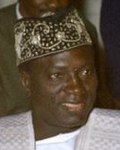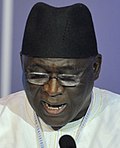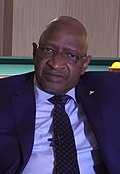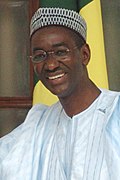| No. | Portrait | Name
(Birth–Death) | Term of office | Political party | Head(s) of state |
|---|
| Took office | Left office | Time in office |
|---|
| 1 |  | Modibo Keïta
(1915–1977) | 20 June 1960 | 1965 | c. 5 years | | US–RDA | Himself |
|---|
| Post abolished (1965 – 19 November 1968) |
| 2 |  | Yoro Diakité
(1932–1973) | 19 November 1968 | 18 September 1969 | 303 days | | Military | M. Traoré |
|---|
| Post abolished (18 September 1969 – 6 June 1986) |
| 3 |  | Mamadou Dembelé
(1934–2016) | 6 June 1986 | 6 June 1988 | 2 years | | UDPM | M. Traoré |
|---|
| Post abolished (6 June 1988 – 2 April 1991) |
| – |  | Soumana Sacko
(1950–2025) | 2 April 1991 | 9 June 1992 | 1 year, 68 days | | Independent | Touré |
|---|
| Konaré |
| 4 |  | Younoussi Touré
(1941–2022) | 9 June 1992 | 12 April 1993 | 307 days | | Independent |
|---|
| 5 |  | Abdoulaye Sékou Sow
(1931–2013) | 12 April 1993 | 4 February 1994 | 298 days | | Independent |
|---|
| 6 |  | Ibrahim Boubacar Keïta
(1945–2022) | 4 February 1994 | 15 February 2000 | 6 years, 11 days | | ADEMA–PASJ |
|---|
| 7 |  | Mandé Sidibé
(1940–2009) | 15 February 2000 | 18 March 2002 | 2 years, 31 days | | ADEMA–PASJ |
|---|
| 8 |  | Modibo Keita
(1942–2021) | 18 March 2002 | 9 June 2002 | 83 days | | Independent |
|---|
| 9 |  | Ahmed Mohamed ag Hamani
(born 1942) | 9 June 2002 | 29 April 2004 | 1 year, 325 days | | Independent | Touré |
|---|
| 10 |  | Ousmane Issoufi Maïga
(born 1946) | 29 April 2004 | 28 September 2007 | 3 years, 152 days | | Independent |
|---|
| 11 |  | Modibo Sidibé
(born 1952) [a] | 28 September 2007 | 3 April 2011 | 3 years, 187 days | | Independent |
|---|
| 12 |  | Cissé Mariam Kaïdama Sidibé
(1948–2021) | 3 April 2011 | 22 March 2012
( deposed ) | 354 days | | Independent |
|---|
| Vacant (22 March – 17 April 2012) |
| – |  | Cheick Modibo Diarra
(born 1952) | 17 April 2012 | 11 December 2012
( resigned ) | 238 days | | Independent | D. Traoré |
|---|
| – |  | Django Sissoko
(1948–2022) | 11 December 2012 | 5 September 2013 | 268 days | | Independent |
|---|
| I. B. Keïta |
| 13 |  | Oumar Tatam Ly
(born 1963) | 5 September 2013 | 5 April 2014 | 212 days | | Independent |
|---|
| 14 |  | Moussa Mara
(born 1975) | 5 April 2014 | 9 January 2015 | 279 days | | Independent |
|---|
| (8) |  | Modibo Keita
(1942–2021) | 9 January 2015 | 10 April 2017 | 2 years, 91 days | | Independent |
|---|
| 15 |  | Abdoulaye Idrissa Maïga
(born 1958) | 10 April 2017 | 31 December 2017
(resigned) | 265 days | | RPM |
|---|
| 16 |  | Soumeylou Boubèye Maïga
(1954–2022) | 31 December 2017 | 18 April 2019 [b] | 1 year, 108 days | | ASMA-CFP |
|---|
| Vacant (18 April – 23 April 2019) |
| 17 |  | Boubou Cissé
(born 1974) | 23 April 2019 | 18 August 2020
( deposed ) | 1 year, 118 days | | Independent | I. B. Keïta |
|---|
| Vacant (18 August – 27 September 2020) |
| – |  | Moctar Ouane
(born 1955) | 27 September 2020 | 24 May 2021
( deposed ) | 239 days | | Independent | B. Ndaw |
|---|
| Vacant (24 May – 6 June 2021) |
| 18 |  | Choguel Kokalla Maïga
(born 1958) | 6 June 2021 | 20 November 2024 [c] [5] | 3 years, 167 days | | Independent | A. Goïta |
|---|
| – |  | Abdoulaye Maïga
(born 1981) | 21 August 2022 | 5 December 2022 | 106 days | | Military |
|---|
| 21 November 2024 | Incumbent | 1 year, 28 days |


















